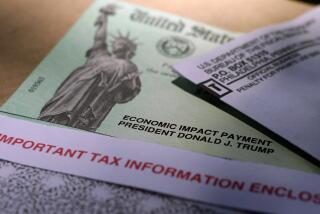Floating Checks No Longer Fly
- Share via
When Congress changed the way banks processed paper checks, it was a long-overdue reform. Unfortunately, though, the new law was tailored to benefit banks at the expense of their customers.
The need for electronic check-processing systems was apparent in the wake of the Sept. 11, 2001, terrorist attacks, which grounded cargo planes that each night ferry paper checks across the country. The Check Clearing for the 21st Century Act, which went into effect last month, allows financial institutions to create electronic images of checks that can be zapped from institution to institution. Banks will be spared the high cost of ferrying paper checks, and the new system will insulate the nation’s financial system from another catastrophic event.
Things aren’t as rosy for consumers. First, they lose the “float,” the time between when a check is written and when the money is actually transferred. It’s a common practice to write a check higher than one’s bank balance, then deposit money later, hoping to cover the check. But even consumer advocates acknowledge that’s a risky strategy because float times vary from two to 11 days. Of more concern is that Congress didn’t order banks to cut the amount of time they can hold onto checks deposited by their customers. That means banks will keep playing the profitable float game by investing those funds.
Consumers Union and other public interest groups fear that the faster clearing times will spark a dramatic increase in overdraft charges until consumers grow accustomed to the new system. It’s also unclear who is going to foot the bill for inevitable glitches -- say, checks that are paid twice or for the wrong amount -- when the electronic system malfunctions. And because paper checks will cease to exist once they’re converted into digital form, consumer groups worry that banks will charge fees for “substitute checks” that will be needed to prove that a bill has been paid.
Banks would be wise to establish a grace period during which overdraft penalties would be eliminated, giving customers time to adapt to the new system. They also could ease security concerns by giving check writers the same higher level of protection enjoyed by those who use debit cards. Finally, banks should voluntarily stop placing holds on deposits for customers with solid credit records. If they don’t, the Federal Reserve should use its powers to level the playing field by eliminating the float for banks.
More to Read
Inside the business of entertainment
The Wide Shot brings you news, analysis and insights on everything from streaming wars to production — and what it all means for the future.
You may occasionally receive promotional content from the Los Angeles Times.










